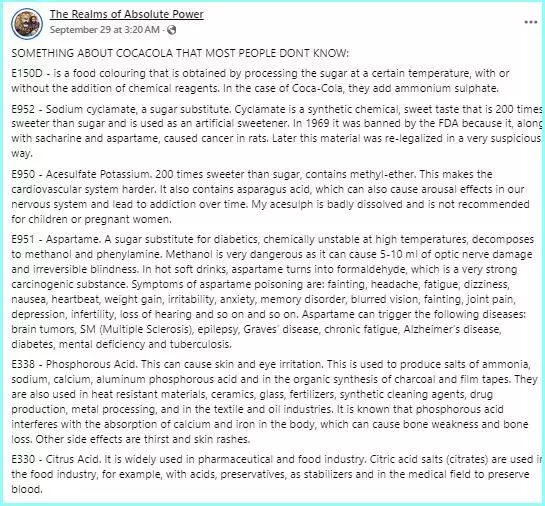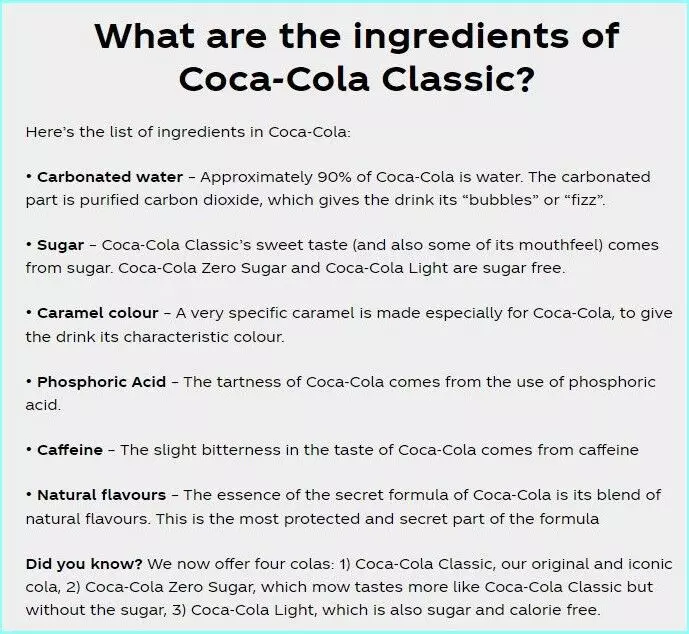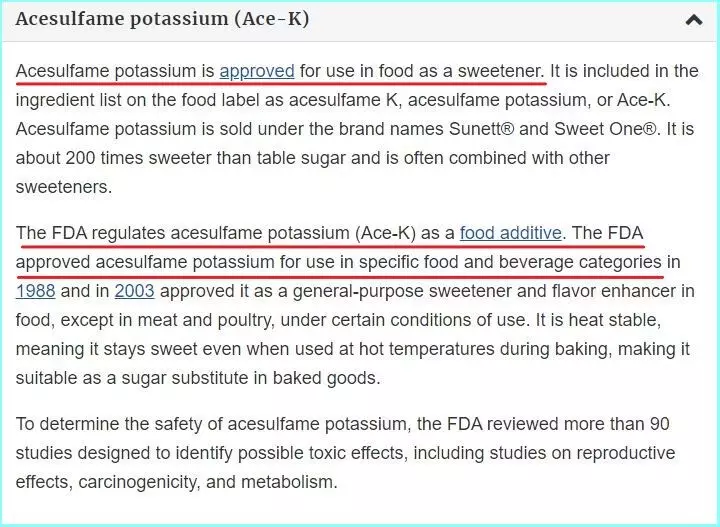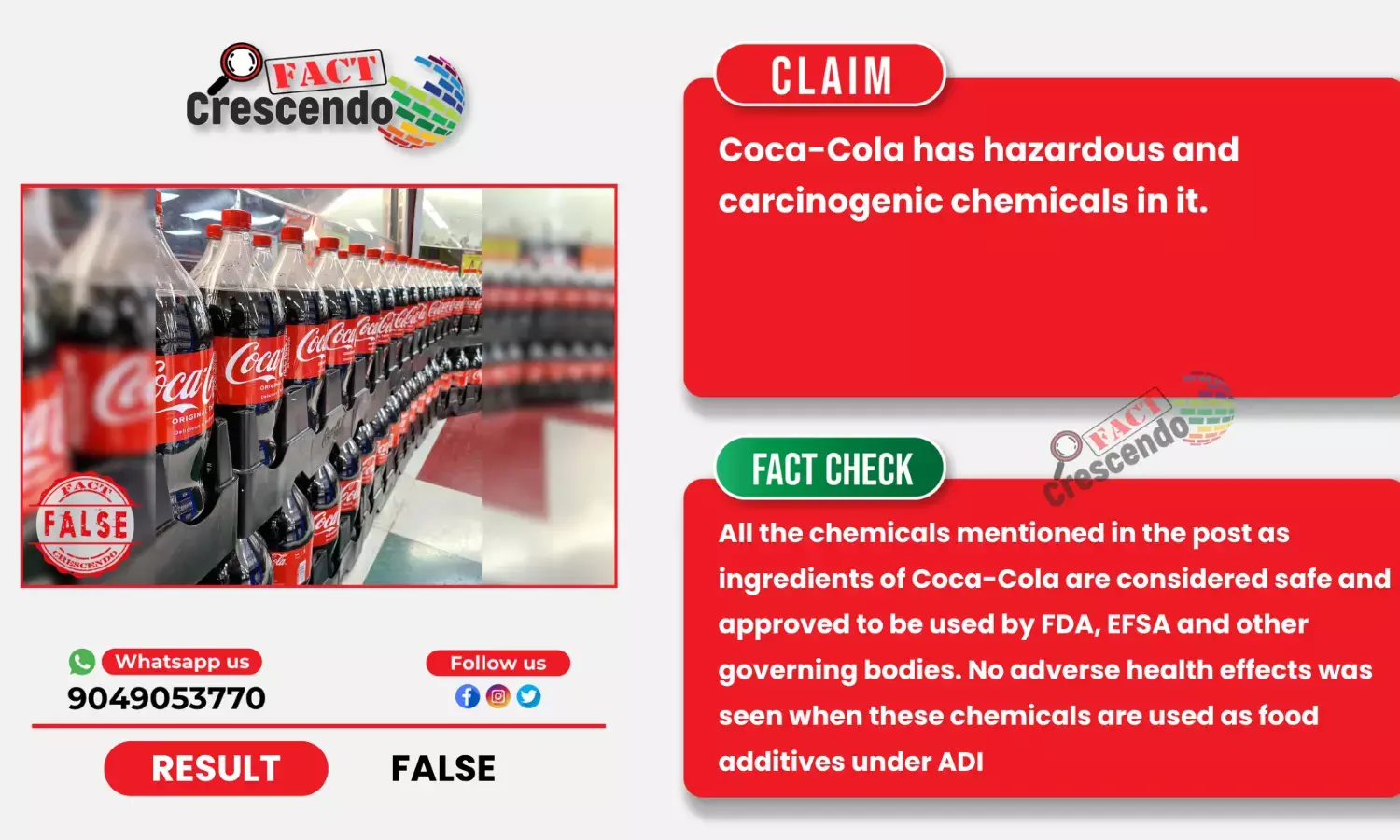Fact Check: Viral Post Claiming Hazardous Ingredients in Coca-Cola
A social media post about the ingredients of Coca-Cola is going viral on social media. The users shared a list of chemicals used by the company in the products which are hazardous, have adverse effect on health and are banned by many foods safety governing bodies. Some of the chemicals listed in the post are Ammonium Sulphate (E150D), Sodium Cyclamate (E952), Acesulfate Potassium (E950), Aspartame, Phosphorous Acid, Citrus Acid etc.
However, Fact Crescendo found that all the ingredients used for the production of Coca-Cola are safe till their amount is with Acceptable Daily Intake (ADI).

Fact Check-
First, we searched for the list of ingredients used in Coca-Cola. We found that all the ingredients used in the Coca-Cola products are mentioned in their website. For Coca-Cola, Carbonated water, Sugar, Caramel Color, Phosphoric Acid, Caffeine and natural flavors are used.

We also found that products like diet coke, diet coke no caffeine etc have additional ingredients like Aspartame, Acesulfame K used as sweeteners and Phosphoric acid and Citric acids.
Let's check the chemicals mentioned in the post.
1) Ammonium Sulphate (E150D): The caramel color of the Coca-Cola came from the chemical Ammonium Sulphate, also known as Sulfite ammonia caramel or E150D. The European Food Safety Authority (EFSA) studied the safety of E150D. After reviewing the data, they set a new guideline for how much of these colors people can safely consume each day. They also found that this caramel color neither genotoxic, nor carcinogenic and also they do not have adverse effects on human reproduction. the organization also suggested that the quantity of these colors should be kept as low as possible.
2) Sodium Cyclamate (E952): As per FDA report, use of Sodium Cyclamate, Calcium cyclamate and other Cyclamate sweeteners are banned in US. However, the FDA has approved the use of highly purified forms of stevia as safe for use in food products. But Sodium Cyclamate is not an ingredient in Coca-Cola. So, this can be considered as a false information that Coca-Cola uses Sodium Cyclamate in its products.
3) Acesulfame potassium (E950): Acesulfame potassium, also known as Ace-K or E950 has been approved by FDA for use in food as a sweetener. The FDA approved acesulfame potassium (Ace-K) as a food additive in 1988 for certain foods and beverages, and in 2003, it was approved as a general sweetener and flavor enhancer. To ensure its safety, the FDA reviewed over 90 studies that looked at potential toxic effects, including its impact on reproduction, cancer risk, and metabolism.

According to another report, FDA and National Cancer Institute (NCI) had confirmed that Ace-K is safe and that there is enough evidence to say that it does not cause cancer. In 2005, the National Toxicology Program conducted a large animal study where they gave mice acesulfame potassium, making up 3% of their diet, for over 40 weeks. This is roughly equal to a person consuming more than 1,000 cans of soft drinks daily. The study found no evidence of an increased risk of cancer in the mice.
4) Aspartame: According to NCI report, in June 2023, International Agency for Research on Cancer (IARC) classified aspartame as Group 2B, meaning it is "possibly carcinogenic to humans." This classification is used when there is limited evidence of cancer risk in humans or convincing evidence in animal studies. At the same time, the Joint FAO/WHO Expert Committee on Food Additives (JECFA) reviewed aspartame and concluded that there was no strong evidence to show it causes harm. JECFA did not change its previous safety recommendations, stating that aspartame breaks down into common food components and no cancer-causing mechanism was found. The FDA disagreed with IARC's classification, citing flaws in their studies.
After reviewing more than 100 studies, FDA concluded that aspartame is safe for the general population when made under good manufacturing practices and used under the approved conditions.
5) Phosphoric Acid (E338): According to FDA, Phosphoric Acid (E338), is Generally Recognized as Safe (GRAS) when used in accordance with food manufacturing practice. Apart from this, the US government, gave a report on the effect of this substance on human health. According to the report, at low concentration, the phosphoric acid is not hazardous and are also an essential mineral nutrient for human health. Phosphoric Acid is Generally Regarded As Safe (GRAS) by the FDA when used in accordance with Good Manufacturing Practices (GMP). But, undiluted Phosphoric Acid can be hazardous and should be handled with caution. Phosphoric Acid is corrosive and should not come into contact with skin or eyes.
According to another report, too much of this substance can cause health issues. While your body needs phosphorus for healthy bones and teeth, excessive intake can lead to bone loss and increase the risk of osteoporosis and heart disease. Too much phosphorus can reduce calcium levels, affecting bone health, and can also interfere with your body’s ability to absorb other important minerals like iron, zinc, and magnesium.
6) Citric Acid (E330): Citric acid, as a food additive has been approved by the U.S. Food and Drug Administration (FDA), European Food Safety Authority (EFSA), Joint FAO/WHO Expert Committee on Food Additives (JECFA), as well as other authorities. Citric acid is considered safe (GRAS) and can be used in food without specific limits, as long as it's produced according to good manufacturing practices. Citric acid anhydrous and monohydrate (E330) are authorised as food additives in Commission Regulation (EU) No 231/2012 and categorized as “additives other than colours and sweeteners
Conclusion:
Fact Crescendo found the claim to be false. All the chemicals mentioned in the post as ingredients of Coca-Cola are considered safe and approved to be used by FDA, EFSA and other governing bodies. No adverse health effects were seen when these chemicals are used as food additives under the acceptable daily intake value.






